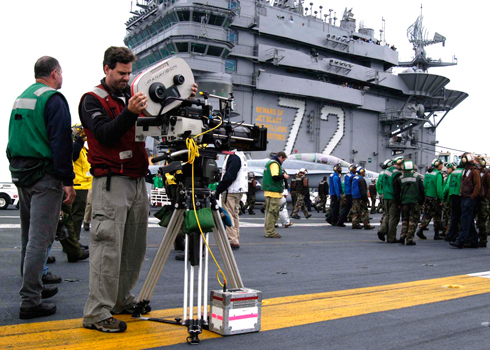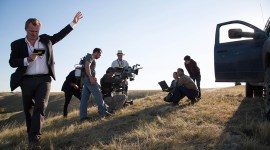
Why Collaboration, Knowledge And Vision Are The Keys To A Successful Directorial Career
First time directors are notorious for not understanding their role in the filmmaking process, and not being able to effectively manage a set. Throughout this article I am going to highlight a few key points that will help those of you that are just getting started as directors to get the most out of yourself and your team.
As someone who enjoys nearly every facet of the filmmaking process, it is undeniably the art of directing that I enjoy most. It really wasn’t until I had made a few films though (and lots of mistakes along the way) that I truly understood what it meant to be a director. Like many inexperienced filmmakers at the time, I felt that directing was purely a creative responsibility. All I wanted to focus on were the elements of the process that were creative by nature, and I neglected to understand that many of the less creative elements of directing (and leading a team) were just as important, and had a just as much of an impact on the final product as anything else.
If you’ve been struggling with directing your own work and ultimately haven’t achieved the results that you’ve been after – this post is for you. No matter how skilled you may be as a director, how great your eye might be for imagery, or how powerful your script is, you still need to follow these key points outlined below in order to get the most out of yourself and your team.
Collaborate Wisely
Filmmaking is a team sport, whether you like to think of it that way or not. You must understand that since filmmaking at it’s core is a collaborative medium, bringing on the right cast and crew (and actually letting them have a say in the creative process) is extremely important. First-time directors are known for having ego-problems, because they feel like they have something to prove on set, and as such are often very insecure. Unfortunately, this type of mentality will directly translate to a sub-par film, as no director (especially an inexperienced one) has all the answers.
Wise directors, whether experienced or novice, surround themselves with talented cast and crew members that will help to elevate their own work, and provide insight and guidance throughout the process. Even the most experienced directors will often work with the same DP, producer, editor, etc. because they understand the importance of collaboration, trust, and respect. At the end of the day if someone on your set has a great idea that they share with you, and you turn it down simply because it wasn’t your own idea, you are truly doing yourself and your film an injustice.
Know Every Facet Of The Process
While you might have a preference for directing, you need to understand all of the major components of filmmaking (cinematography, sound, writing, etc.) inside an out in order to be a great director. In the early days of cinema a director was only responsible for working with their actors, but today the director’s role has expanded greatly. For this reason, in order to perform best as a director you must thoroughly understand the ins and outs of each department.
Take cinematography for example. You might not aspire to be a cinematographer, but the more you know about different cameras, their settings, lenses, lighting set-ups, etc. the more informed your choices will be when it comes to making the right choices (with your DP) to execute the look you’re trying to achieve. It is not about micro-managing your crew so that you are doing their job, but rather giving them to direction that they need to keep their creative choices in line with yours.
Follow Your Vision
If there is one piece of advice that I could provide to any up and coming director, it would be to always trust your gut and follow your vision. At the top of this article, I discussed the importance of surrounding yourself with a great team that will provide you with support, ideas, and resources throughout the filmmaking process. While this is a critical part of the process, it’s just as important to know when you should or shouldn’t take those ideas and integrate them into your film. Think of yourself as a filter that only allows ideas to come through when they are conducive to your vision. After all, collaboration is one thing, but a watered down idea is something very different.
Ultimately if you are being pulled in many different directions with respect to creative choices, your film will suffer. If you ask three different producers for advice on a scene, you are going to get three different suggestions. They may all be great, or they may all be terrible – but it is your job as the director to hear them out and decide which of them (if any) is the best choice for your film.
Don’t make the mistake of not listening to them in the first place, but also don’t make the mistake of listening to everyone and letting your vision get watered down. Try to find the right balance and be confident in your decision making abilities, and you will be well on your way to telling the best story possible.
Treat Your Cast & Crew With Respect

Just like any business, if you find a crew member or actor that you enjoy working with, chances are you’re going to want to work with them again. So when you’re on set be kind to those around you, give credit where credit is due, and nurture good and not-so-good ideas. Treat everyone with equal respect, no matter how big or small their role is on set. These small things are very important characteristics for great directors to have. All parties benefit from fostering great relationships but the ultimate beneficiary is the film itself. The biggest and best film sets that I have ever been on were also the most enjoyable environments to be working in.
The crew members got along, the producers were approachable, and the general feel of the set was very positive. Conversely, the most amateur sets that I’ve ever been on have also been the most hostile. At the end of the day, if you are able to create an environment on set that is enjoyable for those around you, it will not only affect your relationships for future projects, but it will also directly affect the quality level of the project at hand.






